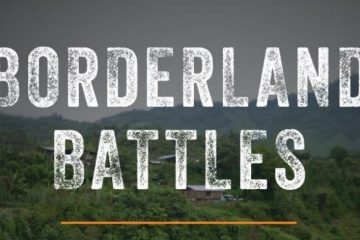
Borderland Battles: Violence, Crime and Governance at the Edges of Colombia’s War
Anette Idler summarizes some of the findings from her new book Borderland Battles, which reveals how violent non-state groups compete for territorial control, co-operate in illicit cross-border activities and replace the state in exerting governance functions in borderlands. Borderlands are like a magnifying glass on some of the most entrenched security challenges of the world. In unstable regions, border areas attract violent non-state groups ranging from rebels and paramilitaries to criminal organisations who exploit their neglect by central governments. These groups compete for territorial control, cooperate in illicit cross-border activities, and substitute for the governance functions usually associated with the state. Studying the Colombian borderlands where armed conflict and organised crime converge demonstrates that the gap between state-centric views on …
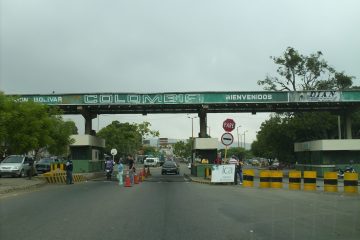
The ‘border effect’ is allowing Venezuela’s crisis to fuel political violence in Colombia
As Venezuela’s crisis continues, so too do its serious repercussions for neighbouring countries. Of the four million Venezuelans that have left the country – the largest migrant crisis in the region’s recent history – more than 1.3 million have arrived in Colombia, on Venezuela’s western border. But this comes at a time when Colombia itself still faces high levels of violence. Though its government signed a peace deal with the FARC guerrilla group in 2016, their counterparts in the National Liberation Army (ELN) have yet to give up arms. Elsewhere, the number of FARC dissidents is rising, and other violent non-state groups – from right-wing paramilitaries to Mexican drug cartels – are jostling for position in the race to fill the void created by demobilisation of …
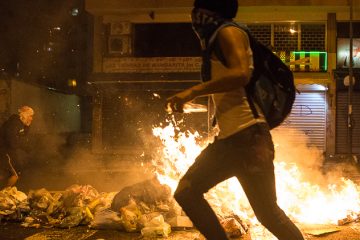
Venezuela’s instability has far broader implications. Here’s what’s at stake
Venezuela seems locked in a downward political and economic spiral. But what happens in Venezuela has far broader implications for international security. “Here you must not speak badly about Chávez” — this was the message on banners at a Colombia-Venezuela border bridge I crossed recently on a research trip. It was just one of the signs of the exponential jump in authoritarianism in Venezuela, and the continued unravelling of the regime. Last Saturday, Chief Prosecutor Luisa Ortega, a critic of the government of President Nicolás Maduro, was dismissed. On Sunday, a military uprising left one dead and several injured, then other military dissidents used social media to call for other soldiers to disobey the president. By Tuesday, parliament was practically …
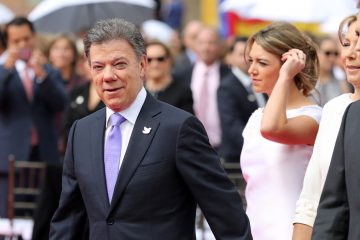
Santos got the Nobel Prize for not giving up on peace – here’s why all Colombians won
Only days after the people of Colombia voted to reject a historic peace deal he spent years negotiating, the Colombian president, Juan Manuel Santos, received the Nobel Peace Prize for his efforts to end the country’s decades-long war with the FARC guerrilla movement. The no vote came a week after the government and the FARC had signed a peace deal, and after they had declared a bilateral ceasefire and the end of all hostilities at the end of August. Nevertheless, the Nobel Peace Prize Committee has given Santos and his fellow negotiators a vote of confidence – one that they have earned through years of dogged and determined work. Santos became president in 2010 after serving as defence minister under his presidential predecessor Alvaro …
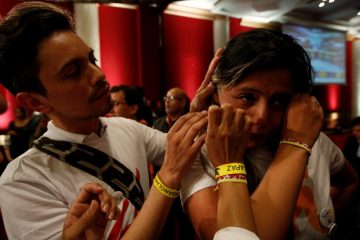
Colombia has voted no on its plebiscite for peace. Here’s why and what it means
On Sunday, the Colombian people rejected the recent peace deal that the Colombian government had reached with the Revolutionary Armed Forces of Colombia (FARC) after 52 years of civil war. The plebiscite narrowly failed: 50.2 percent rejected the peace accord, while 49.8 percent were in favour. What, exactly, were Colombians voting on? Colombians cast votes on whether they support the peace agreement, reached in August and formally signed on Sept. 26. The content of the 297-page peace accord had been made public before the vote. Who voted no? The “no” vote is not representative of all Colombians. Less than 40 percent of Colombians voted in the plebiscite, leaving many voices unheard. This was partly related to weather conditions; the Caribbean …
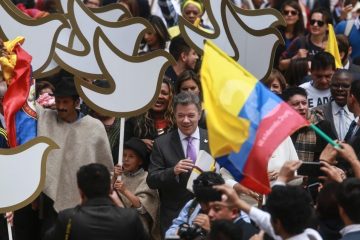
Why the real test for Colombia’s peace begins after the demobilization process
On Aug. 29, 2016, the Colombian government and the leftist insurgent group FARC initiated a cease-fire. The two parties had reached a remarkable peace accord a few days earlier, hoping to end 52 years of civil war. Colombian President Juan Manuel Santos announced that the peace deal will be formally signed Sept. 26, which would trigger the 180-day demobilization of the FARC. Colombia’s armed conflict, the longest-running in recent global history, left more than 220,000 people dead and about 6.7 million displaced within the region. The cease-fire formalizes the end of combat activities between state forces and the FARC, formally known as the Revolutionary Armed Forces of Colombia — and all hostilities against civilians. After decades of brutal violence and several failed peace processes, this …
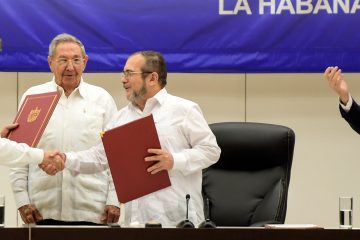
A momentous peace deal with the FARC – so what next for Colombia?
The groundbreaking news reached me when I was in Bogotá in a meeting with the head of the Colombian Army: after more than 50 years of armed conflict, and four years of negotiations, the Colombian government and the leftist guerrilla group, the FARC, have reached a final peace agreement. The historic deal looks set to bring to an end the longest running war of recent history. The agreement is cause for huge celebration, but an official end to war with the FARC is only the start of the road to peace. Securing sustainable peace needs a balance of addressing the immediate security risks during the period of transition, as well as anticipating the long-term challenges that may emerge. ‘Yes’ or …
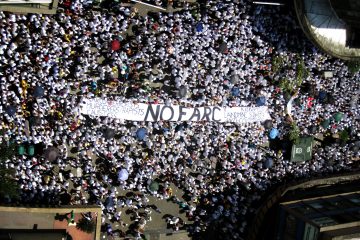
What will the peace process mean for Colombia’s border regions? The government will have to start governing.
The “how” and the “when” of Colombia’s latest peace breakthrough are of course important — but so is the “where” and “with whom.” On June 23, the Colombian government and the Revolutionary Armed Forces of Colombia-People’s Army (FARC) signed a bilateral ceasefire agreement, after more than five decades of armed conflict. For Colombia’s peace process to succeed, it will need to break the cycle of conflict, organized crime and state neglect in Colombia’s border regions. The agreement stipulates that the FARC lay down its weapons within 180 days of a final peace deal, which has a July target date. The disarmament will take place in 23 specific “normalization zones” and eight camps, all of which cease to exist after these 180 days. The …










